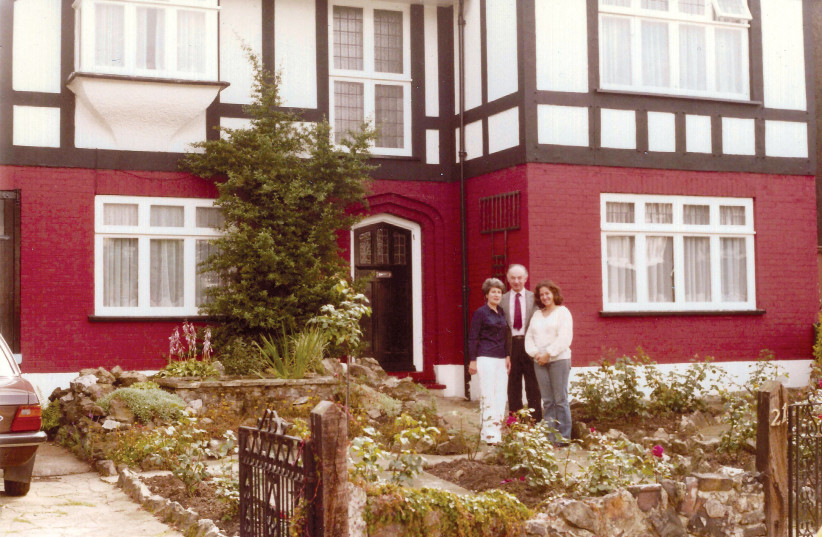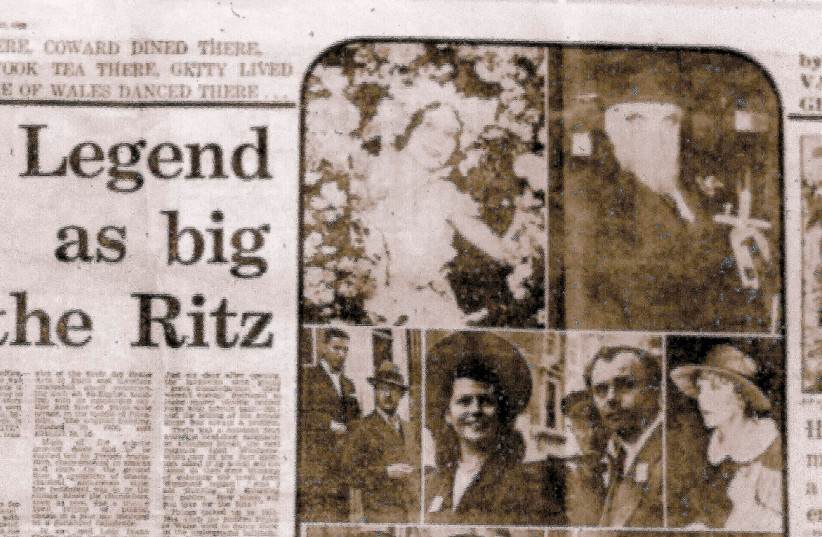What were the chances that two random residents of a crumbling immigrant absorption center housing newcomers in Arad would meet over tea at the King’s Court in the Waldorf Astoria Hotel in Jerusalem over 40 years later with husbands and a nonagenarian mummy in tow?
An East-End bookie wouldn’t give you good odds on it.
Indeed it seemed that cosmic/divine forces combined to bring it about. My husband – having just read the review of the afternoon tea newly offered at the hotel in these pages – turned to me with a far-away look in his eyes. He suggested we invite Ruth to tea. Never one to turn down a party of any size, I got the ball rolling.
Excited that Jerusalem had an elegant setting for a proper British tea, we invited Ruth Tuckman née Bayer to join us as a small way to say an overdue thank you for hosting us in London when we were newlyweds. The upstairs bedroom of Norman and Ruth Tuckman’s Streatham Hill home was our hotel, and gracious hosts they were indeed.
This exotic honeymoon location was pure fantasy come true for us freshly graduated students. It came about due to the instant click I had with Jeanette Tuckman when she and I were both students at the World Union of Jewish Students ulpan in 1979.

She, London-born, was in the program following studying English literature and history and had already made aliyah, while I, Brooklyn-born, landed there following degrees in international government and law. I was interested in the language studies and the proffered soft entrée into Israeli life, but what stuck with me were the stimulating classes that filled gaps in my academic studies.
Studying with Level Aleph 2 Hebrew for the Israel Bar exam, newly engaged and planning a wedding long distance was all I could manage, barely. Tuckman extended her parents’ invitation that we visit them in London. Following our stateside wedding on our return to officially move to Israel, we did.
The location allowed for an exploration of the southern London location, with a short walk to the Tube passing by Prison Brixton. And we were off for a great, if off-beat, honeymoon, replete with home-baked challot for Shabbat and culminating in an invitation to join our hostess for tea at the famed Ritz Hotel. It was all we could do but not gape at the elegant surroundings while being offered delicate cucumber and butter sandwiches and tea.
Taking things another notch up, our hosts mailed – walking a sealed envelope with a stamp on it to the post office – us a news article to Israel as a souvenir, a clipped article titled “Legend as big as the Ritz” with our names scissored and glued letter by letter to near-seamlessly become part of the overline: “Waugh proposed there, Coward dined there, Heddy and Benson took tea there, the Prince of Wales danced there.” That is what I call cut and paste. We were touched and never forgot.
THE WALDORF did more than a credible job of tea. I was delighted to have genuine Brits guide us through the offerings.
My 96-year-old forever-young seatmate explained that the three-tiered presentation trays were meant to start at the bottom with the savory (“the bread’s sliced too thick,” she murmured) tea sandwiches and climb through the totally exquisite pastry level, and then finish with the top-most presentation of scones. On this, there was no equivocation; both Londoners agreed that they were perfect. So, with or without raisins, we slathered butter, jams and freshly whipped cream to our hearts desire, and bypassed tradition to get right to the scones.
With individual full china pots of tea of our choosing (from organic black to Earl Grey, Chinese green jasmine and even chai latte) to warm us up from within as well as our cold hands on a chilly day, our conversation warmed as we covered much ground.

There was the inevitable question as to whether or not one puts the milk in before or after the hot brew, strainers and timers were available to obtain the perfectly steeped teas for each type, which were great conversation pieces but for the most part regarding tea, we locals are not quite so pernickety. Followed by favorable comparisons to Fortnum and Mason’s, Selfridges’, and – take a breath – Harrods’ tea offerings; all in all, we lot were quite, ahem, chuffed.
Formalities aside, reminiscences of teas past and other associations rose like steam from our cups. The younger Tuckman, by now also Koll, is long married to Arthur Koll, a retired diplomat, who occasionally contributes opinion pieces to The Jerusalem Post from his viewpoint as the former ambassador to Serbia and Montenegro.
He recalled being a young diplomat in London, with full formal attire and top hat being driven in a horse-drawn carriage through Hyde Park accompanying the new ambassador presenting his credentials to Queen Elizabeth, and attending an official dinner in the presence of Her Royal Highness when then-president of Israel Ezer Weizman was on a state visit to London. The couple remembered taking tea with the diplomatic corps on the lawn of Buckingham Palace and remarked, “The English tea served in the Waldorf would certainly be approved of by HRH.”
From his vantage as one of two sons born to his Holocaust-surviving parents in Romania from where he made aliyah, and serving as counselor of public affairs, it all seemed something of a wonder. Koll recalled sitting in close proximity to a Lord Balfour, who descended from Foreign Secretary Arthur Balfour, whose 1917 letter to Jewish community leader Lord Walter Rothschild became the foundational letter leading to the creation of Israel.
As conversations do, one thought brings another in its wake, and the senior Tuckman, who does not miss a beat, pulled up learning that the precursor of that letter was Russian-born then-biochemistry lecturer Prof. Chaim Weizmann’s patented discovery isolating acetone, a component that eventually was harnessed into the massive quantities for creating smokeless gunpowder (cordite) necessary to bring British and Allied victory in World War I. The “Weizmann process” patent celebrated its 100th birthday in 2015.
When asked by Lord Balfour how the country could thank him, as Tuckman further remembered, “Weizmann wanted neither riches nor title, he asked for a homeland for his people,” in her still German-tinged British English. The Balfour letter followed, the state was created and history changed.
As a footnote, my own uncle from the upper Carpathian Mountains of Hungary, Eliezer Feig, who made aliyah directly after surviving Auschwitz, lived in Rehovot and worked at what became the Weizmann Institute, where his last name, according to family lore, was turned into a nickname of endearment by the same Weizmann.
Tuckman’s memories were well stirred as if with her delicate teaspoon and she turned to her arrival in England as a child. She was born in Breslau, Germany (now Wroclaw, Poland), one of three children to Walter and Paula Bayer. She remembers they lived in a four-story building that her grandfather had built, comprised of commercial and office space, a residence for them and another story of apartments for tenants. Their non-Jewish tenants saw what was happening under the Nazis and they told her parents quietly, “We will pay dearly for their policies,” she remembers.
After the Kindertransport program to save some of the German-Jewish children from the Nazis was organized, she and her sister were taken to the train station where armed SS soldiers stood guard over them. At 13, she was in charge of her younger sister (her older brother left with the Youth Aliyah for Palestine). She remembers boarding the train and fighting back tears as she bade farewell to her parents, being told to not let the soldiers have the satisfaction of seeing them cry nor to make it more difficult for their distraught parents. Her inner strength was and continues to be innate.
She also recalls arriving in rural England to Stoatley Rough School for the new arrivals run by a German headmistress, who was vocally opposed to the Nazi policies and needed to leave Germany to avoid being deported to a camp herself. Senior Tuckman remembers crying quietly to herself for some time, but soon realized that she must resolutely adjust to her new life. She recalls the remarkable woman who kindly ran the home for a hundred traumatized children, and after the war, she returned to Germany to take upon herself the responsibility of educating German youth about their past as she saw fit. “There were good Germans too,” Tuckman adds.
For the wife of the diplomat, the London stint meant not only returning to her roots but also entailed being far from the Kolls’ oldest son, Noam, one of three, who was and still is a resident at Beit Uri, a village home and school in Afula in the Jezreel Valley for developmentally and mentally disabled children and adults. He was born with the Cri du chat syndrome, a rare genetic disorder characterized by a cat-sounding cry.
My once-upon ulpan friend is far along from the public relations writing she did for Hebrew University when she started out. She now devotes her efforts to the Beit Uri residency program and fundraises for the wide range of therapeutic classes available to them. Recent generous donations resulted in the building of a state-of-the-art complex for 24/7 assisted living where Noam and others now live.
Hailing from Germany, Romania, England and the US, our intertwined histories brought us together for a spot of tea and scones in a lovely Jerusalem setting. Neither of us former students could ever have envisioned this while sharing Wonder Pot creations in our quarters in Arad. What were the odds?
